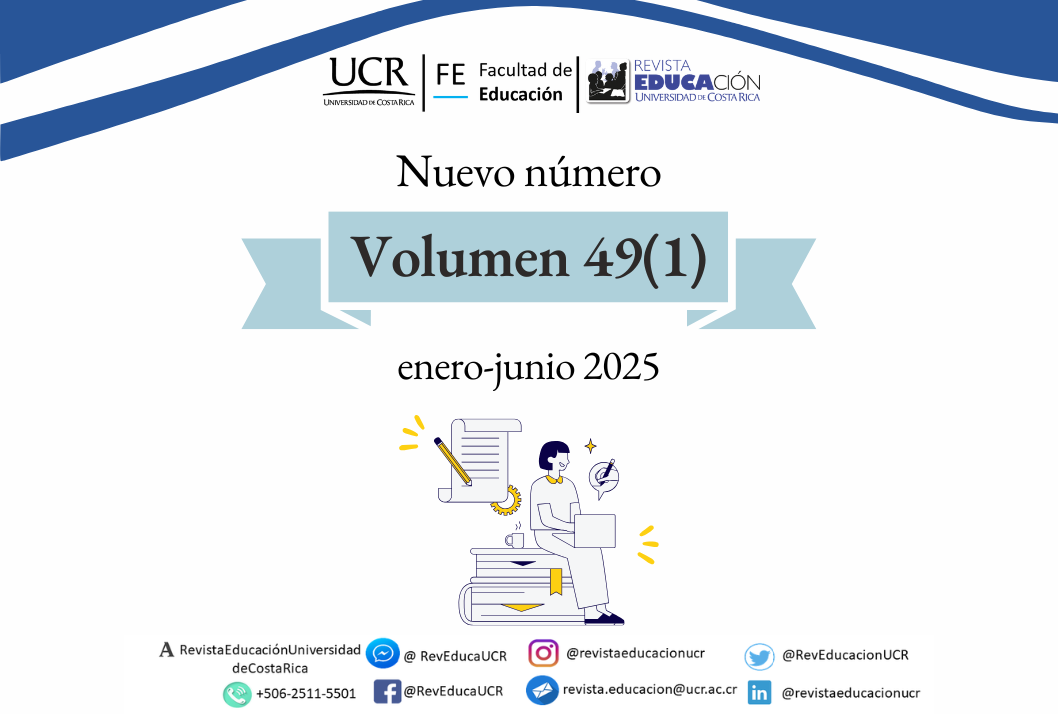Abstract
The aim of this study is to understand the perception of virtual learning among the teaching staff of the English with Business Management Training program at the Pacific Campus of the University of Costa Rica. This research stems from the diagnostic phase of the teaching project PD-D-723-2023, "Reflection on the Practices in Virtual Courses of Teachers in the English with Business Management Training Program." The study employs a mixed-methods approach with a sequential explanatory design, where the first instrument is analyzed quantitatively, and the second is analyzed qualitatively through thematic analysis. The first instrument was applied to 26 teachers, and the second to 15, representing the total number of faculty involved with the program at the time of data collection. Key findings reveal that the teaching staff share a similar concept of virtual education and have developed an increasingly positive attitude toward it, opening the door to future research on continuous training in emerging technological trends, such as artificial intelligence. It is concluded that, despite limited experience in designing and delivering virtual courses before the pandemic, the teaching staff have a positive outlook on the incorporation of virtual learning across disciplines. Continuous professional development is recommended to maximize the benefits of virtual education, supported by institutional resources, and the results of this project should be shared with the broader academic community.
References
Alvarenga, X. y Montero, M. (2023, 24-26 de mayo). Espacios para repensar la docencia: la experiencia de los proyectos de docencia en la Universidad de Costa Rica [Conferencia]. IX Congreso Internacional sobre Tecnología e Innovación + Ciencia e Investigación CITICI2023, Cartagena, Colombia (en prensa).
Calixto, R. y Herrera, L. (2010). Estudio sobre las percepciones y la educación ambiental. Tiempo de Educar, 11(22), 227-249. https://www.redalyc.org/pdf/311/31121072004.pdf
Cardona, L. (2021). Percepciones de docentes frente al cambio en tiempos de pandemia. Educación y Ciencia. (25), 1-25. https://doi.org/10.19053/0120-7105.eyc.2021.25.e12515
Centro de Investigaciones y Servicios Educativos. (2020, abril). ¿Cuáles son los tipos de Evaluación Educativa? Escuela Superior Politénica del Litoral. https://www.cise.espol.edu.ec/sites/cise.espol.edu.ec/files/Tipos%20de%20evaluaci%C3%B3n.pdf
Cisneros-Barahona, A., Marqués Molías, L., Samaniego-Erazo, N., Uvidia-Fassler, M., Castro-Ortiz, W. y Rosas-Chávez, P. (2022). Competencia digital del profesorado universitario: Una panorámica del estado de la cuestión. HUMAN REVIEW. International Humanities Review / Revista Internacional de Humanidades, 11(Monográfico), 1-25. https://www.researchgate.net/publication/366629324_Competencia_digital_del_profesorado_universitario_Una_panoramica_del_estado_de_la_cuestion
Creswell, J. (2003). Research Design: Qualitative, Quantitative, and Mixed Methods Approaches [Diseño de investigación: Enfoques Cualitativo, Cuantitativo y Mixto] (2da ed.). Sage Publications.
Delgado, M. y Solano, A. (2009). Estrategias didácticas creativas en entornos virtuales para el Aprendizaje. Revista Actualidades Investigativas en Educación, 9(2), 1-21. http://dx.doi.org/10.15517/aie.v9i2.9521
Guías de Aprendizaje TIC dirigidas a profesores de la UASLP. (2019). Creación y uso de video como material educativo. Universidad Autónoma de San Luis Potosí. https://academica.uaslp.mx/ga/tic/video/GuiaIncorporacionTIC_Video.pdf
Guido, E., Montero, M., Badilla, E., Calvo, I., Rodríguez, W. y Hütt, H. (2014, 30 de julio-1 de agosto). Proyectos para pensar la docencia universitaria. [Conferencia]. I Congreso internacional innovación en la docencia, Guanacaste, Costa Rica. https://sedeguanacaste.ucr.ac.cr/wp-content/uploads/2022/08/Congreso-Internacional-Innovacion-en-la-Docencia-I.pdf
Hodges, C., Moore, S., Lockee, B., Trust, T. y Bond, A. (2020, 27 de marzo). The Difference Between Emergency Remote Teaching and Online Learning [La diferencia entre la Enseñanza Virtual de Emergencia y el Aprendizaje en Línea]. EDUCAUSE. https://er.educause.edu/articles/2020/3/the-difference-between-emergency-remote-teaching-and-online-learning
Iriondo, W. y Gallego, D. (2013). El currículo y la educación a distancia. Revista Iberoamericana de Educación a Distancia, 16(1), 109-132. https://www.redalyc.org/pdf/3314/331427377006.pdf
Jiménez, D., Mora, M. y Cuadros, R. (2016). La importancia de las nuevas tecnologías en el proceso educativo. Propuesta didáctica TIC para ELE: mELEndien7dias. Revista Fuentes, 18(2), 209-223. https://revistascientificas.us.es/index.php/fuentes/article/view/2814
Keegan, D. (1996). Foundations of Distance Education [Fundamentos de la Educación a Distancia] (3ra ed.). Routledge.
López-Montero, R. (2022). Experiencia de la virtualidad en extensión docente debido a la pandemia por COVID-19: El caso del proyecto de idiomas de la Sede del Pacífico de la Universidad de Costa Rica en el marco de su décimo aniversario. Revista InterSedes, 23(47), 142-160. https://doi.org/10.15517/isucr.v23i47.48099
Merton, R., Fiske, M. y Kendall, P. (1956). The Focused Interview: A Manual of Problems and Procedures [Entrevista Focalizada: Manual de Problemas y Procedimientos]. Free Press.
Moreira-Segura, C. y Delgadillo-Espinoza, B. (2014). La virtualidad en los procesos educativos: reflexiones teóricas sobre su implementación Tecnología en Marcha, 28(1), 121-129. https://www.scielo.sa.cr/pdf/tem/v28n1/0379-3982-tem-28-01-00121.pdf
Organización de las Naciones Unidas para la Educación, la Ciencia y la Cultura [Unesco]. (2020). COVID-19 Educational Disruption and Response [Interrupción educativa y respuesta ante el COVID-19]. Unesco. https://en.unesco.org/covid19
Parra-Castrillón, J. (2022). Percepciones internas y externas sobre calidad de la educación en línea. Revista Electrónica Educare, 26(2), 1-18. https://doi.org/10.15359/ree.26-2.24
Pereira, Z. (2011). Los diseños de método mixto en la investigación en educación: Una experiencia concreta. Revista Electrónica Educare, 15(1), 15-29. https://doi.org/10.15359/ree.15-1.2
Redecker, C. (2020). Marco Europeo para la Competencia Digital de los Educadores: DigCompEdu. (Trad. Fundación Universia y Ministerio de Educación y Formación Profesional de España). Secretaría General del Ministerio de Educación y Formación Profesional de España (Original publicado en 2017). https://www.metared.org/content/dam/metared/pdf/marco_europeo_para_la_competencia_digital_de_los_educadores.pdf
Sanabria, I. (2020). Educación virtual: Oportunidad para “aprender a aprender”. Análisis Carolina, (42), 1-14. https://doi.org/10.33960/AC_42.2020
Unidad de Apoyo a la Docencia mediada por TICS [METICS]. (2024). Marco Integrado de Competencias Digitales para el Aprendizaje Híbrido. Universidad de Costa Rica. https://metics.ucr.ac.cr/es/component/sppagebuilder/29-marco-integrado-de-competencias-digitales-para-el-aprendizaje-hibrido
Universidad de Costa Rica. (2022). Rectoría. Resolución R-49-2022. https://www.rectoria.ucr.ac.cr/site/documentos-de-archivos/resoluciones/r-49-2022/
Vicerrectoría de Docencia. (2022). Iniciativas docentes. Universidad de Costa Rica https://vd.ucr.ac.cr/proyectos/
Yañez, F., Rodríguez, R. y Briones, S. (2011). Percepciones de los docentes acerca de la incorporación de las aulas virtuales en la enseñanza. RIDE Revista Iberoamericana para la Investigación y el Desarrollo Educativo, 2(1), 1-22. https://www.redalyc.org/pdf/4981/498150310004.pdf
##plugins.facebook.comentarios##

This work is licensed under a Creative Commons Attribution-NonCommercial-NoDerivatives 3.0 Unported License.
Copyright (c) 2024 Revista Educación - Journal of Education







